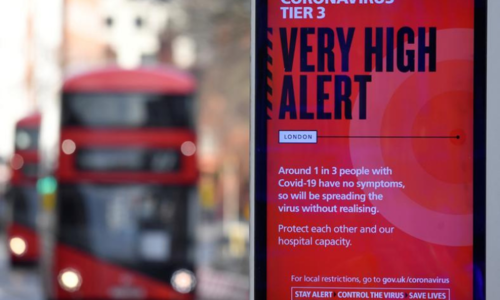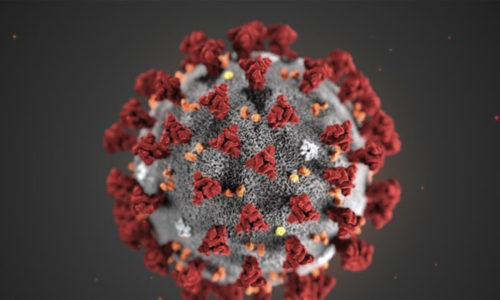Pakistan on Monday joined a slew of countries who have closed their borders to Britain over fears of a highly infectious new coronavirus strain, heightening global panic and causing travel chaos.
A meeting of the National Command and Operation Centre (NCOC) placed a temporary restriction on inbound travellers from the UK (direct or indirect) to Pakistan that will come into effect on the midnight of December 22 (i.e. 00:00 hours Dec 23) and last until the midnight of Dec 29, according to a communique sent to the Civil Aviation Authority by the Aviation Division.
The restriction will apply to all persons who start their travel from the UK and are in or have been in the UK over the past 10 days, said the letter, a copy of which is available with Dawn.com.
Transit passengers who do not leave the airside in the UK from destinations other than the UK will be allowed entry into Pakistan.
Meanwhile, Pakistani passport holders who have travelled to the UK on visitor/temporary visas will be allowed to return to the country with the following arrangements:
1) A negative PCR test, conducted within 72 hours prior to flight, will be required
2) PCR test on arrival in Pakistan under arrangement with the Directorate of Central Health Establishment or regional health staff. Passengers will be required to stay in the airport or in a government facility until the PCR test is taken
3) Mandatory enforced home quarantine for seven days
4) Trace and test will be applied to all passengers who have arrived from the UK over the past seven days as well as passengers arriving on Dec 21 and Dec 22
The NCOC also decided to make the 'Pass Track' app mandatory for all travellers arriving in Pakistan with effect from midnight Dec 22. Passengers without the app will need to fill out the web form of the Pass Track app.
A growing list of European Union nations and Canada barred travel from the United Kingdom on Sunday and others were considering similar action, in a bid to block the new strain of the coronavirus sweeping across southern England from spreading to their countries.
France, Germany, Italy, the Netherlands, Belgium, Austria, Ireland and Bulgaria all announced restrictions on UK travel, hours after British Prime Minister Boris Johnson announced that Christmas shopping and gatherings in southern England must be cancelled because of rapidly spreading infections blamed on the new coronavirus variant.
Johnson immediately placed those regions under a strict new Tier 4 restriction level, upending Christmas plans for millions.
France banned all travel from the UK for 48 hours from midnight Sunday, including trucks carrying freight through the tunnel under the English Channel or from the port of Dover on England’s south coast. French officials said the pause would buy time to find a “common doctrine” on how to deal with the threat, but it threw the busy cross-channel route used by thousands of trucks a day into chaos.
The Port of Dover tweeted on Sunday night that its ferry terminal was “closed to all accompanied traffic leaving the UK until further notice due to border restrictions in France.”
Eurostar passenger trains from London to Paris, Brussels and Amsterdam were also halted.
Germany said all flights coming from Britain, except cargo flights, were no longer allowed to land starting midnight Sunday. It didn’t immediately say how long the flight ban would last. Belgian Prime Minister Alexander De Croo said he was issuing a flight ban for 24 hours starting at midnight “out of precaution”.
“There are a great many questions about this new mutation,” he said, adding he hoped to have more clarity by Tuesday.
Canada announced its own ban Sunday night. Prime Minister Justin Trudeau said in a statement that for 72 hours starting at midnight Sunday, “all flights from the UK will be prohibited from entering Canada.” He added that travellers who arrived Sunday would be subject to secondary screening and other health measures. A follow-up statement from the government said cargo flights were not included in the ban.
The Central American nation of El Salvador, meanwhile, said it would refuse entry to anyone who has visited Britain in the preceding 30 days.

The British government said Johnson would preside at a meeting of the government’s crisis committee, COBRA, on Monday in the wake of the other nations’ measures. They come at a time of huge economic uncertainty for the UK, less than two weeks before it leaves the EU’s economic structures on Dec 31, and with talks on a new post-Brexit trade relationship still deadlocked.
Johnson said Saturday that a fast-moving new variant of the virus that is 70 per cent more transmissible than existing strains appeared to be driving the rapid spread of new infections in London and southern England in recent weeks. But he stressed “there’s no evidence to suggest it is more lethal or causes more severe illness,” or that vaccines will be less effective against it.
On Sunday, British Health Secretary Matt Hancock added to the alarm when he said “the new variant is out of control.” The UK recorded 35,928 further confirmed cases, around double the number from a week ago.
Germany, which holds the rotating EU presidency, called a special crisis meeting on Monday to coordinate the response to the virus news among the bloc’s 27 member states.
The Netherlands banned flights from the UK for at least the rest of the year. Ireland issued a 48-hour flight ban. Italy said it would block flights from the UK until Jan 6, and an order signed Sunday prohibits entry into Italy by anyone who has been in the UK in the last 14 days.
The Czech Republic imposed stricter quarantine measures on people arriving from Britain.
Beyond Europe, Israel also said it was banning flights from Britain, Denmark and South Africa because those were the countries where the mutation is found.
India suspended all flights from the UK from midnight until December 31, saying that anyone arriving from Britain on transit flights would be also tested.
Poland, which like India has a large diaspora population in Britain, also said that flights from the UK were being banned from midnight while Moscow is suspending flights from the UK for a week.
Hong Kong is banning all flights arriving from the UK from midnight, and the quarantine of passengers who arrived from Britain in the last fortnight is being extended. All international arrivals must already spend 14 days in isolation in a hotel.
Turkey's Health Minister Fahrettin Koca said that flights from Britain and Denmark — where nine cases of the new strain have been detected — the Netherlands and South Africa would be suspended.
Iran's health ministry has ordered flights from Britain suspended for two weeks while Israel said it was barring entry to foreign citizens travelling from Britain, Denmark and South Africa.
Prime Minister Benjamin Netanyahu's office also announced tough quarantine rules for Israelis returning home from those nations.
Saudi Arabia said it was halting all flights and entry through land and sea ports for at least a week, with the option to extend for a further week.
New variant
The World Health Organisation tweeted late on Saturday that it was “in close contact with UK officials on the new #COVID19 virus variant” and promised to update governments and the public as more is learned.
The new strain was identified in southeastern England in September and has been spreading in the area ever since, a WHO official told the BBC on Sunday.
“What we understand is that it does have increased transmissibility, in terms of its ability to spread,” said Maria Van Kerkhove, WHO’s technical lead on Covid-19.
Studies are underway to better understand how fast it spreads and whether “it’s related to the variant itself, or a combination of factors with behaviour,” she added.
She said the strain had also been identified in Denmark, the Netherlands and Australia, where there was one case that didn’t spread further.
“The longer this virus spreads, the more opportunities it has to change,” she said. “So we really need to do everything we can right now to prevent spread.”
Viruses mutate regularly, and scientists have found thousands of different mutations among samples of the virus causing Covid-19. Many of these changes have no effect on how easily the virus spreads or how severe symptoms are.
British health authorities said that while the variant has been circulating since September, it wasn’t until the last week that officials felt they had enough evidence to declare that it has higher transmissibility than other circulating coronaviruses.
Patrick Vallance, the British government’s chief scientific adviser, said officials are concerned about the new variant because it contained 23 different changes, “an unusually large number of variants” affecting how the virus binds to and enters cells in the body.
Officials aren’t certain whether it originated in the UK, Vallance added. But by December, he said it was causing over 60pc of infections in London.
United States President-elect Joe Biden’s nominee for US surgeon general said Sunday that the emergence of the new strain doesn’t change the public health guidance on precautions for reducing the spread of the virus, such as wearing masks, social distancing and washing hands.
“While it seems to be more easily transmissible, we do not have evidence yet that this is a more deadly virus to an individual who acquires it,” Vivek Murthy said on NBC’s “Meet the Press”. “There’s no reason to believe that the vaccines that have been developed will not be effective against this virus, as well.”
Europe has been walloped this fall by soaring new infections and deaths due to a resurgence of the virus, and many nations have reimposed a series of restrictions to reign in their outbreaks.
Britain has seen over 67,000 deaths in the pandemic, the second-highest confirmed toll in Europe after Italy. Europe as a whole has recorded nearly 499,000 virus deaths, according to a tally by Johns Hopkins University that experts believe is an undercount, due to limited testing and missed cases.
The European Medicines Agency, meanwhile, is meeting Monday to approve the first Covid-19 vaccine for the European Union’s 27 nations, bringing vaccinations closer for millions of EU citizens. The vaccine made by German pharmaceutical company BioNTech and American drugmaker Pfizer is already in use in the United States, Britain, Canada and other countries.
The EMA moved up its assessment of the Pfizer-BioNTech vaccine by a week after heavy pressure from EU governments, especially Germany, which has said that after the EMA approval it could start vaccinating citizens as early as next Sunday.
Further restrictions
In an urgent address to the nation on Saturday, Johnson ordered all non-essential shops, hairdressers and gyms in London and large parts of southern England closed and told Britons to reorganise their holiday plans. No mixing of households is allowed indoors in the region, and only essential travel is permitted. In the rest of England, people will be allowed to meet in Christmas bubbles for just one day instead of the five that were planned.
After he spoke, videos emerged online showing crowds of people at London’s train stations, apparently making a dash for places in the UK with less stringent coronavirus restrictions. Health Secretary Matt Hancock called those scenes “totally irresponsible”.
While Hancock insisted officials had acted “very quickly and decisively”, critics said Britain’s Conservative government should have moved against rising infections much earlier.
“The alarm bells have been ringing for weeks, but the prime minister chose to ignore them,” said Keir Starmer, leader of the opposition Labour Party. “It is an act of gross negligence by a prime minister who, once again, has been caught behind the curve.”















































